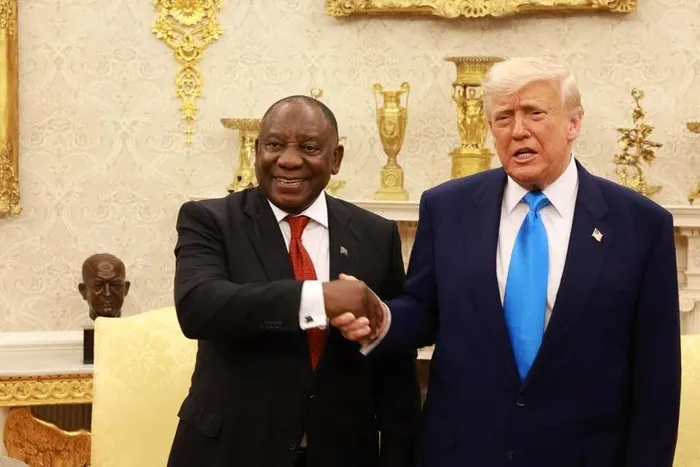Trumps slaps SA with 30% tariffs - demands local companies move manufacturing to the US

South Africa will be hit with a 30% tariff on all its exports to the United States from August 1, following a formal letter from US President Donald Trump to President Cyril Ramaphosa demanding action on trade imbalances and long-standing market restrictions.
Image: GCIS
South Africa will be hit with a 30% tariff on all its exports to the United States from August 1, following a formal letter from US President Donald Trump to President Cyril Ramaphosa demanding action on trade imbalances and long-standing market restrictions.
In a letter dated 7 July and sent on official White House stationery, Trump said the move was “necessary to correct the many years of South Africa’s Tariff, and Non Tariff, Policies and Trade Barriers,” blaming Pretoria for what he called “unsustainable Trade Deficits against the United States.”
The sweeping tariffs will apply to “any and all South African products sent into the United States,” and are being imposed outside of any sectoral trade deals. The announcement follows a similar pattern of tariff notices sent to over a dozen countries in recent weeks, with South Africa facing one of the highest proposed rates.
“Our relationship has been, unfortunately, far from Reciprocal,” Trump wrote. “Starting on August 1, 2025, we will charge South Africa a Tariff of only 30%... Goods transshipped to evade a higher Tariff will be subject to that higher Tariff.”
Trump also warned that if South Africa were to retaliate by raising its own tariffs, those would be matched and added to by Washington.
“Whatever the number you choose to raise them by, will be added onto the 30% that we charge,” he wrote.
“This Deficit is a major threat to our Economy and, indeed, our National Security!”
The letter reflects the hard line the Trump administration is taking with countries it accuses of taking advantage of American markets.
South Africa is one of several emerging economies singled out by the White House over the past month, alongside Laos, Myanmar, Malaysia and Kazakhstan.
Trump added: “We invite you to participate in the extraordinary Economy of the United States, the Number One Market in the World, by far. We have had years to discuss our Trading Relationship... and have concluded that we must move away from these longterm, and very persistent, Trade Deficits.”
He claimed the 30% tariff was “far less than what is needed to eliminate the Trade Deficit disparity,” and signalled there would be no tariffs if South African firms shifted manufacturing to the US
“We will do everything possible to get approvals quickly, professionally, and routinely — in other words, in a matter of weeks.”
The letter also left the door open to negotiation, although conditionally.
“If you wish to open your heretofore closed Trading Markets to the United States, and eliminate your Tariff, and Non Tariff, Policies and Trade Barriers, we will, perhaps, consider an adjustment to this letter,” Trump wrote.
The South African government has not yet issued an official response.
However, trade experts warn that the tariffs could have far-reaching consequences for the country’s automotive, wine, citrus and mining sectors key export earners to the US market.
IOL News